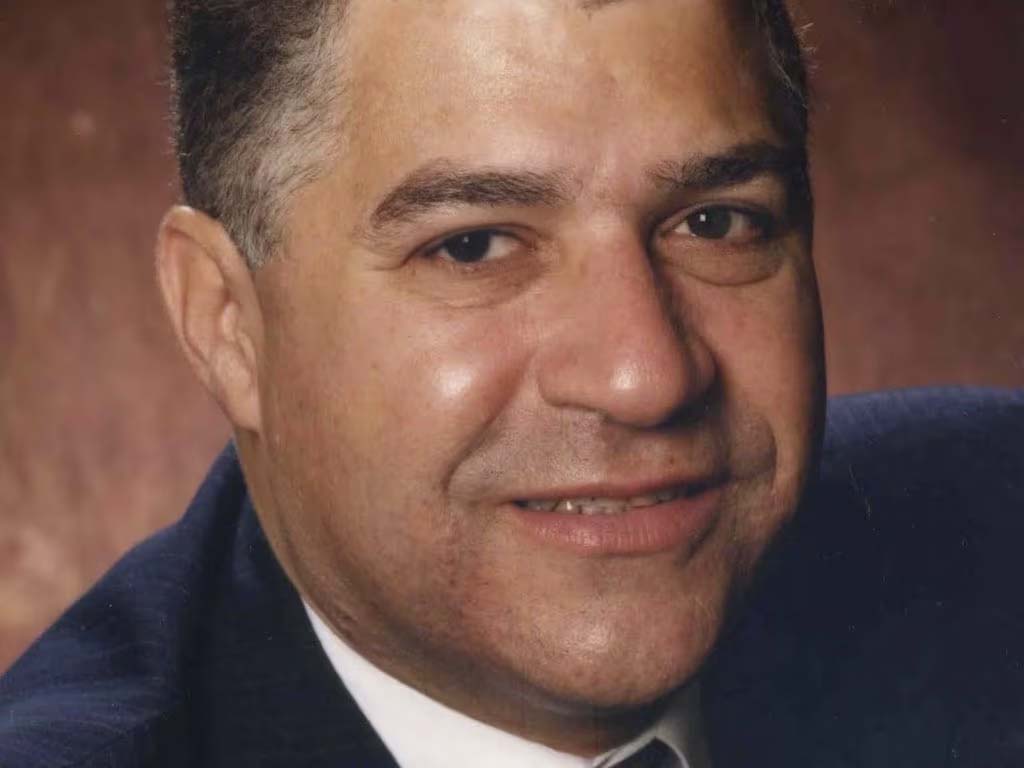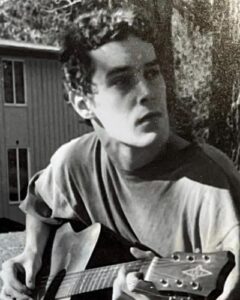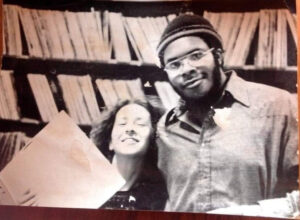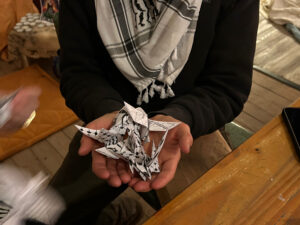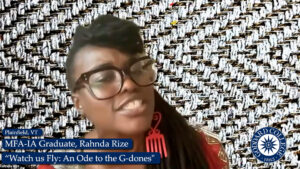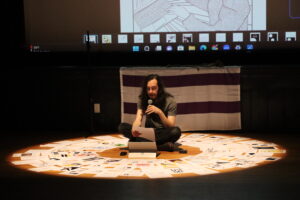
The Spring 2018 Goddard College MFAW Commencement speaker in Port Townsend was alum John Schmidtke. Here is his address:
Let me tell you how I ended up here today.
In early November, I got a call on my cellphone from an unidentified Vermont number.
I was driving, but I was too curious to let the call go to voicemail.
I answered on my hands-free.
The phone connection wasn’t great.
It was Elena.
She said, “Hello, John.” in her London accent.
“What’s up?” I said, hoping she wasn’t going to ask me to return my diploma.
“This is an unusual call,” Elena replied. “The graduating class wonders if you would be available to speak at the February commencement.”
I was startled. I thought it was a joke.
“No,” she assured me. “They asked for you.”
The hair on my arms stood up as we talked.
I knew I wasn’t worthy.
There are so many better writers available, so many wiser people.
They are right here.
I said yes immediately.
I’m not sure that’s the answer Elena wanted to hear.
Then I asked her, “So what’s the theme for this winter’s residency?”
“The commencement speaker doesn’t normally use the residency’s theme,” Elena told me. “You can talk about anything you want. If I were you I would talk about your journey—Why Goddard? Why an MFA? What did you discover while attending?”
“Okay,” I said. “But just in case, what’s the residency’s theme?”
“Lust and fun,” Elena said.
My foot came off the gas a bit.
“Lust and fun?” I asked.
“Yes,” Elena said.
Let me pause right here to confess that while I attended Goddard, lust took over my life.
I cheated on my wife Mary almost every night for two years.
Mary and I have been married 40 years—our first kiss was 42 years ago this weekend.
Nevertheless, while at Goddard, I’d stay up late at night, flirting with every pretty word I met.
I’d canoodle with the loose syllables that I’d pick up while hanging around the spacebar on my MacBook Pro.
I’d allow alliterations and assonance easy access to my cheater’s heart.
And I’d persistently pursue sultry sentences with steady, rhythmic strokes on my keyboard until they spilled out on my screen in an orgy of paragraphs.
I had great fun doing it.
So when I heard Elena say “lust and fun,” that phrase made perfect sense to me.
But I wasn’t sure that as a commencement speaker I should discuss my nightlife as a nonfiction philanderer.
I checked with Elena one more time.
“‘Lust and Fun’?” I asked. “‘Lust’ with a ‘U’?”
“Oh, God no!” Elena said quickly, horrified and laughing at the same time. “Lost with an ‘O’! ‘Lost and Found’!”
I was disappointed.
“Lust” has so many more interesting ins and outs as the theme of a commencement speech than “lost.”
And what’s fun about being found?
So this afternoon I’m going to pretend that Elena had never corrected my mishearing.
I’ll follow her suggestion to talk about my growth as a writer.
But my theme today is “lust and fun.”
~~~
I came to Goddard with no big plans.
The only thing I wanted to do was play with words at the sentence level.
I didn’t have anything significant to say, but I wanted to say it well.
I also wondered which genre would choose me as a writer.
Which one would find me an irresistible plaything?
Maybe I’d have a brief fling with a short story.
Maybe I’d have a novel experience with longer prose.
Maybe I’d enjoy an autoerotic evening playing with my memoir.
Or maybe I’d get amped for lyric romps by doing line after line with poetry.
I didn’t know which genre would be the true love of my literary lust life.
~~~
In my G1 semester, while I was speed dating with potential genres, I snail-mailed my packets from my home in Hawai‘i to my advisor, Bea Gates, who lives in Maine.
Mostly, the packets I sent were filled with vignettes about my life.
Some of you might know that I coach wrestling in one of my other incarnations.
The vignettes I sent to Bea were the kinds of stories I’d tell my fellow wrestling coaches when we’d sit around drinking beers and swapping lies after a long day at a tournament.
I’d tickle the truth in my stories in the hope that I’d make the other coaches spray beer out of their noses.
With each packet I mailed to Bea, I tried to make her snort, too.
I also tried to flirt with Bea.
I’d send her a poem in every packet that I mailed from Honolulu to Penobscot.
I tried to arrive in Bea’s mailbox every three weeks wearing my best Priority Mail envelope, and I’d present her with a corsage of sonnets, a vase of villanelles, a single long-stemmed sestina, or a pretty posy of pantoums.
I even considered sending her a lei of limericks.
Nothing seemed to work.
Here’s why, I think.
There’s a story about W.H. Auden and identifying promising new poets.
Auden was asked what advice he would give to a young writer who wished to become a poet.
He replied that he would ask why the young writer wanted to become a poet.
If the answer was, “because I have something important to say,” Auden would conclude that there was no hope for the young writer as a poet.
If on the other hand the answer was something like “because I like to hang around words and overhear them talking to one another,” then that young writer was at least interested in the fundamental part of the poetic process and there was hope for the writer as a poet.
When Bea Gates read my flowery poems, she must have thought I was trying to say something important.
Like Auden, Bea must have concluded there was no hope for me.
I say that because early in my G1 semester, Bea encouraged me to write memoir.
Strongly encouraged.
Apparently, she found my prosody to be prosaic.
The reason I sent poems in my packets to Bea is because I’m fascinated with wordplay.
I’m extremely jealous of poets.
You could say I have meter envy.
It’s an envy of the poet’s freedom to fondle eager and willing words.
An envy of a poet’s verbal busses on a reader’s lips using repeated bilabial stops.
An envy of the poet’s cunning ability to twist a reader’s tongue and make phrases arch and verses gasp.
An envy of the poet’s ability to give aural pleasure using a mouth filled with voluptuous and round vowel sounds.
And an envy of a poet’s caressing cadences that cause a careful reader to succumb in iambic shudders.
So it’s no wonder that when Elena—who is a poet—called me in November, I clearly heard her say “lust.”
~~~
Writing, like lusting, involves the pursuit of pleasure.
The poet Robert Frost described the process of writing poetry as “the pleasure of taking pains.”
John Ciardi, the poetry editor for the Saturday Review for 16 years, said about the process of writing poems: “no difficulty, no fun. And the great fun, of course, is in making the hard look easy.”
I think when writing in any genre—not just poetry—the harder you work at making the hard look easy, the greater the fun and the greater the pleasure you get from taking pains.
~~~
Here’s my personal story about the pleasure of taking pains with my work and about trying to make the hard look easy.
It’s adapted from the last chapter of my thesis.
It’s the only lust-less part of my talk today, but it’s a story filled with passion.
My wife Mary and I toured Ireland in late September 2007.
We drove around the Ring of Kerry.
We stopped at a small museum that gave the history of the Skellig islands.
Those two islands sawtooth out of the north Atlantic, eight miles to sea.
Like spiritual alchemists, they turn agnosticism into the acceptance of in an almighty.
Panels next to the displays in the museum told us about the 7th century monks who lived and worked on those islands as they cut stones by hand to build a Catholic monastery.
One of the panels discussed medieval life on the islands.
It pondered whether the monks found pleasure in taking pains with their work. It read:
To be an Early Christian was a matter attitude.
Did the monks consider the backbreaking work of monastery-building a task of penance?
Or was it a joyous, fulfilling experience of marrying hands, skill, rock, and fine design?
Did the imposed isolation by a stormy sea constitute an indefinite prison sentence to be endured bravely and silently?
Or was it a soul-thrilling experience to witness the massive power of ocean waves, and the unyielding strength of Skellig rock?
Was it a dulling, stupefying monotony to hear and see nothing but the endless wheeling and screaming of seabirds all day?
Or was the word of God in every flimsy feather and every trembling wingtip?
~~~
When I started writing to write—when I got serious about playing with words—I read On Writing Well by William Zinsser.
He wrote beautifully about the pain of setting words on paper in just the right order.
He impaled himself on the craft of writing clearly, elegantly, and to the point.
I also read Bird By Bird by Anne Lamott.
She made writing seem a joyous, fulfilling experience of marrying hands, skill, words and fine design to create art.
I realized that for me to be happy writing, I had to be writing happy.
Like Lamott, I needed to find pleasure in the pain of working with my words.
I needed to roll playfully around the page with each one, wrestling hard to connect them into artful phrases, grappling to craft my sentences just as clearly, just as elegantly, and just as to the point as Zinsser, but with the smiling word of God in every flimsy feather and every trembling wingtip of my prose.
And that’s what Goddard taught me to do.
~~~
To Elena: Thanks for suggesting the theme of my commencement speech.
It never would have occurred to me on my own.
To the faculty: Thanks for teaching writing in a program so inclusive in its spirit that a recent grad is welcomed back the next semester to speak at graduation.
That could not have happened in any place in the writing world except for here.
To my friends who are graduating: Thank you for inviting me to share your day.
Congratulations on your achievement.
As W.H. Auden advised, be passionate about hanging out with your words.
Enjoy eavesdropping on every one of their conversations.
Don’t ever lose what you’ve found here.
And always remember that the best writing is all about lust and fun.
John Schmidtke is a recent graduate of the MFAW Program at Goddard College. He is an attorney and lives in Hawaii.

